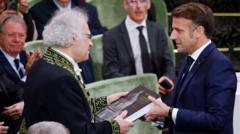After nearly four decades of meticulous work, the esteemed sages of Paris finally presented the ninth edition of the Dictionnaire de l’Académie Française to President Macron, marking a significant yet contentious moment in the evolution of the French language. This formal event took place in the grandeur of the 17th century Collège des Quatre-Nations, home to the elite members of the French Academy, known as immortels, who have devoted themselves to the preservation and purity of French linguistics since Cardinal Richelieu established the institution in 1635.
The Academy was tasked from the beginning with the goal of “giving certain rules to our language, rendering it pure and eloquent.” However, the fruition of this lofty endeavor has proved painstakingly slow. The first edition did not materialize until 1694, and contemporary efforts yield only a single letter's worth of new vocabulary each year. This lead to growing skepticism regarding the practicality of the enterprise. Linguists lamented that while the undertaking is commendable, its slow progress renders it almost obsolete.
The comprehensive ninth edition attempts to reflect linguistic developments from the 1950s to the present, introducing 21,000 new terms. However, critics point out that many of these entries feel outdated, as the evolution of language is rapid and often outpaces the Academy's work. Notably missing from the latest edition are ubiquitous modern expressions such as "tiktokeur," "vlog," "smartphone," and "émoji," all of which are commonly found in contemporary dictionaries. Instead, the Académie has included terms like "soda," "sauna," and "yuppie," which fail to represent the current vernacular.
In a nod to evolving societal concepts, the recent edition emphasizes the feminization of professional titles, reflecting contemporary views on gender roles. However, print versions of the earlier sections remain unchanged, indicating a hesitance to fully embrace these linguistic shifts. Moreover, traditional definitions persist, such as the depiction of marriage as a bond exclusively between a man and a woman, despite significant legislative advancements in France.
In response to these critiques, the Academy maintains that it serves as a reflective vantage point of its time. The organization, now led by writer Amin Maalouf, continues to meet weekly to discuss new definitions and revisions, albeit amidst ongoing debates regarding its relevancy in a world where online dictionaries provide a more dynamic and comprehensive lexicon.
As discussions are already in motion for the tenth edition, the future of the Dictionnaire de l’Académie Française remains uncertain, as it grapples with the challenge of merging tradition with the progressive transformation of language in modern society.




















